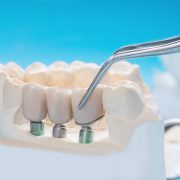Crowns Vs. Veneers: What’s the Difference?
If you have a damaged tooth, you may be a good candidate for dental crowns or dental veneers, depending on what’s wrong. These two dental tools can serve similar functions but are not the same.
Understanding the difference can help you decide which one is right for you. If you’re in need of either, your dentist in Stuart, FL can help. At Stuart Dentist we offer a range of services, including dental crowns and dental veneers. We can help you decide which one is right for you.
What Are Dental Crowns?
A dental crown is a cap that’s placed over your tooth to protect and reinforce the enamel. Most of the time, dental crowns look like natural teeth. However, some dental crowns are made from gold and other metals. Crowns that are made from metal do not look very natural, and are usually placed in the back of the mouth.
If you have a root canal, your dentist will install a crown on the tooth to protect the enamel from further damage. You may also need a crown if your tooth is badly cracked or broken.
What Are Veneers?
A veneer is a cover placed on the front of the tooth to hide what the tooth looks like, and make the teeth look uniform. Veneers do not provide structural support to the tooth, but instead add aesthetic beauty and can help you achieve your goals for your smile.
If your tooth is suffering from cosmetic damage, veneers are right for you. If your tooth has structural damage and cosmetic damage, you may need a crown instead.
Have questions? Need dental veneers or dental crowns in Stuart, FL? Call us today to make an appointment and get started with your next dental procedure.




